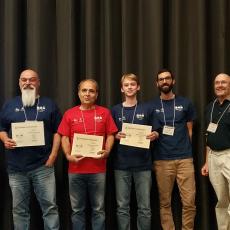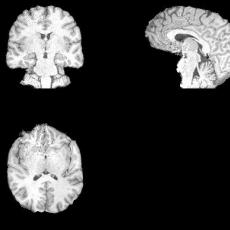CORE COURSES: Complete the following courses (9 units)
CS M10DS
Introduction to Data Science (3 units)
Provides a comprehensive introduction to the field of Data Science. Studies machine learning which is a type of artificial intelligence (AI) that provides systems the ability to automatically learn and improve from experience without being explicitly programmed. Distinguishes supervised and unsupervised machine learning (Data Mining) algorithms. Studies the emergence of massive datasets containing millions or even billions of observations which provides the primary incentive for the field, such data sets arise, for instance, in large-scale retailing, telecommunications, astronomy, engineering, health, and internet social media. Provides the key knowledge of data development, management, statistical analysis, data visualization, and inference.
CS M10ML
Cloud Data Science and Machine Learning (2 units)
Utilizes various cloud based Data Science tools and services available from Amazon Web Services (AWS) cloud platform to perform data science analysis and machine learning. Uses various examples of how data science and machine learning is used to process vast amounts of collected data to derive predictive analysis. Uses tools such as AWS SageMaker and Amazon Forecast and computer vision tools such as Amazon Rekognition, Amazon Ground Truth, image and video processing and other AWS data science services. Uses Natural Language processing such as Amazon Polly, Amazon Comprehend, and Amazon Translate. Uses AWS Academy Data Science and Machine Learning curriculum. Aligns to Data Science industry professional certification training. Prepares students to pass relevant AWS data science professional certification.
MATH M15/M15H
Introductory Statistics (4 units)
Explores the nature of statistical methods, including description of sample data, probability, theoretical frequency distributions, sampling, estimation, testing hypotheses and special topics. Provides problem solving techniques.
Choose one of the following Area of Emphasis
Business Administration Emphasis (6 units Total)
BUS M30
Introduction to Business (3 units)
Provides a multidisciplinary examination of how culture, society, economic systems, legal, international, political, financial institutions, and human behavior interact to affect a business organization’s policy and practices within the U.S. and a global society. Focuses on how these influences impact the primary areas of business including: organizational structure and design; leadership; human resource management; organized labor practices; marketing; organizational communication; technology; entrepreneurship; legal, accounting, and financial practices; the stock and securities market; and therefore how they affect a business’ ability to achieve its organizational goals.
BUS M140
Business Information Systems (3 units)
Examines information systems and their role in business. Focuses on information systems, database management systems, networking, e-commerce, ethics and security, computer systems hardware and software components. Emphasizes application of these concepts and methods through hands-on projects developing computer-based solutions to business problems.
Computer Science Emphasis (6-7 units Total)
CS M10DB
Database Management Systems and Applications (3 units)
Introduces modern database concepts while emphasizing the relational database model. Includes such topics as design methodologies, normalization of tables to reduce redundancies, supertypes and subtypes to reduce nulls, data integrity, referential integrity, and using locks and other techniques for concurrency control in a multi-user database. Describes the factors that should be balanced during the design of a database. Documents databases, entity relationship diagrams, relational schemas, and data dictionaries are described. Applies the principles by performing exercises using MS SQL Server, MySQL, or other database management system. Uses SQL and other languages to create and fill tables, retrieve data, and manipulate it by stored programs.
CS M10P
Introduction to Computer Programming using Python Language (4 units)
Provides an introduction to computer programming and algorithm design using the Python programming language. Covers the fundamentals of computer programming: basic data types, switching and looping constructs, functions, recursion, objects, arrays, and lists, and basic input and output, both interactive and with files. Explains some principles of algorithm design and analysis as well as techniques for testing programs.
OR
CS M10R
Introduction to R Programming (3 units)
Introduces computer programming and algorithm design using the R programming language. Covers an introduction to R, from installation to most of the statistical concepts, and machine learning. Includes the fundamentals of computer programming concepts: basic data types, variables, if-else, loops, functions, vectors, objects, matrices, arrays, data frames, lists, factors, basic input, data visualization, and output with files. Explains some principles of algorithm design and analysis as well as techniques for testing programs.
Hospitality Management Emphasis (6 units)
HOSP M120
Hospitality Cost Control (3 units)
Provides an overview of the analysis and management of food, beverage, labor and other costs within a hospitality operation. Emphasizes problem solving and application of cost control techniques to maximize profits while managing expenses. Focuses on establishing standards, cost-volume-profit analysis, forecasting, purchasing and storage controls, menu costing and pricing, theft prevention and labor control.
One course from below:
HOSP M130
Introduction to Food and Beverage Management (3 units)
Explores and develops techniques and procedures of management as they relate to commercial and institutional food and beverage facilities. Studies functions of management, marketing, menu development, effective cost controls in purchasing, labor and service techniques.
HOSP M140
Introduction to Hotel Management (3 units)
Provides an introduction to the operations and components of a hotel-resort facility. Focuses on front office, housekeeping, food and beverage, sales and marketing, accounting, property maintenance, human/resource management and information systems.
HOSP M170
Hospitality Supervision and Guest Relations (3 units)
Provides an overview of the structure and practices of supervision in the hospitality industry: recruiting, hiring, training, retention, discipline, and employee engagement. Presents an introduction to guest relations practices: customer service, conflict resolution, ethics, etiquette, and serving guests with unique and diverse needs.
Mathematical Theory Emphasis (6-7 units)
Select and complete one of the following Math courses:
MATH M37DS
Probability & Statistics for Data Science (3 units)
Introduces probability and statistics with linear algebra for data science. Emphasizes probability distributions, inferential statistics, and linear models as well as the ethical use of data. Covers applications of statistical programming for data science.
MATH M42DS
Mathematics of Machine Learning for Data Science (3 units)
Introduces machine learning algorithms with linear algebra for data science. Emphasizes the mathematical foundations of ensemble methods, discriminant analysis, deep learning, and neural networks as well as the ethical use of data. Covers applications of algebraic programming for data science.
Select and complete one of the following Computer Science courses:
CS M10P
Introduction to Computer Programming using Python Language (4 units)
Provides an introduction to computer programming and algorithm design using the Python programming language. Covers the fundamentals of computer programming: basic data types, switching and looping constructs, functions, recursion, objects, arrays, and lists, and basic input and output, both interactive and with files. Explains some principles of algorithm design and analysis as well as techniques for testing programs.
CS M10R
Introduction to R Programming (3 units)
Introduces computer programming and algorithm design using the R programming language. Covers an introduction to R, from installation to most of the statistical concepts, and machine learning. Includes the fundamentals of computer programming concepts: basic data types, variables, if-else, loops, functions, vectors, objects, matrices, arrays, data frames, lists, factors, basic input, data visualization, and output with files. Explains some principles of algorithm design and analysis as well as techniques for testing programs
Social Sciences Emphasis (7 units)
PHIL M07
Introduction to Logic (3 units)
Explores deductive and inductive reasoning, definitions, verification, argument forms, and analyzes formal and informal fallacies. Analyzes the nature of arguments for validity and soundness. Includes a study of formal techniques of sentential logic and predictive logic.
POLS M09
Introduction to Political Science Research Methods (3 units)
Surveys the research methods employed in political science. Introduces the topics of research design, experimental procedures, descriptive methods, and instrumentation. Examines the collection, interpretation, and reporting of research data, as well as the ethics of research.
POLS M122
Independent Study - Political Science (1 unit)
Allows independent study for students who wish to extend their knowledge of a
particular area of Political Science through research and study. Utilizes an approved independent study project. Includes one-on-one work with instructor. Interested students should contact a Political Science instructor for assistance in developing a contract for learning about a specific topic.
OR
PHIL M122
Independent Study - Philosophy (1 unit)
Allows independent study for students who wish to extend their knowledge of a
particular area of Philosophy through research and study. Utilizes an approved
independent study project. Includes one-on-one work with instructor. Interested students should contact a Philosophy instructor for assistance in developing a contract for learning about a specific topic.



